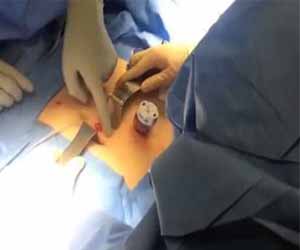- Home
- Editorial
- News
- Practice Guidelines
- Anesthesiology Guidelines
- Cancer Guidelines
- Cardiac Sciences Guidelines
- Critical Care Guidelines
- Dentistry Guidelines
- Dermatology Guidelines
- Diabetes and Endo Guidelines
- Diagnostics Guidelines
- ENT Guidelines
- Featured Practice Guidelines
- Gastroenterology Guidelines
- Geriatrics Guidelines
- Medicine Guidelines
- Nephrology Guidelines
- Neurosciences Guidelines
- Obs and Gynae Guidelines
- Ophthalmology Guidelines
- Orthopaedics Guidelines
- Paediatrics Guidelines
- Psychiatry Guidelines
- Pulmonology Guidelines
- Radiology Guidelines
- Surgery Guidelines
- Urology Guidelines
Gastric electrical stimulation device effective in reducing refractory vomiting

France: Gastric electrical stimulation (GES) reduced the frequency of refractory vomiting in patients with and without diabetes, according to a recent study published in the journal Gastroenterology. The study further found that GES did not increase the quality of life or accelerate gastric emptying.
There have been conflicting results from trials of GES for treatment of refractory vomiting, associated or not with gastroparesis. Bruno Guerci, Nancy University Hospital, Nancy, France, and colleagues performed a large, multicenter, randomized, double-blind trial with crossover to study the efficacy of GES in patients with refractory vomiting, with or without gastroparesis.
The trial comprised of 172 patients -- including 133 with gastroparesis -- with chronic refractory vomiting (idiopathic, associated with diabetes or postsurgical). A GES device was implanted in every patient and was left inactivated until randomization.
Patients were randomized into two groups -- to groups that received 4 months of stimulation parameters (14 Hz, 5 mA, pulses of 330 μs) or no stimulation (control). After 4 months, 149 patients crossed over to the other group for another 4 months of therapy.
Patients were examined at the end of each 4-month period (at 5 and 9 months after implantation).
Primary endpoints were vomiting score, ranging from 0 (daily vomiting) to 4 (no vomiting), and the quality of life, assessed by the Gastrointestinal Quality of Life Index scoring system. Secondary endpoints were changes in other digestive symptoms, nutritional status, gastric emptying, and control of diabetes.
Read Also: Gastric electrical stimulation significantly improves gastroparesis symptoms
Key findings of the study include:
- During both phases of the crossover study, vomiting scores were higher in the group with the device on (median score, 2) than the control group (median score, 1; P < .001), in diabetic and nondiabetic patients.
- Vomiting scores increased significantly when the device was ON in patients with delayed or normal gastric emptying.
- Gastric emptying was not accelerated during the ON period compared with the OFF period.
- Having the GES turned on was not associated with an increased quality of life.
Read Also: Vagal nerve stimulation improves symptoms in gastroparesis patients
“This trial demonstrates that GES is effective in reducing the frequency of refractory vomiting and nausea in a subset of patients with chronic vomiting. Further studies are warranted to determine predictive factors of favorable response and the technique’s cost-effectiveness," concluded the authors.
The study, "Gastric Electrical Stimulation Reduces Refractory Vomiting in a Randomized Crossover Trial," is published in the journal Gastroenterology.
DOI: https://doi.org/10.1053/j.gastro.2019.10.018

Disclaimer: This site is primarily intended for healthcare professionals. Any content/information on this website does not replace the advice of medical and/or health professionals and should not be construed as medical/diagnostic advice/endorsement or prescription. Use of this site is subject to our terms of use, privacy policy, advertisement policy. © 2020 Minerva Medical Treatment Pvt Ltd